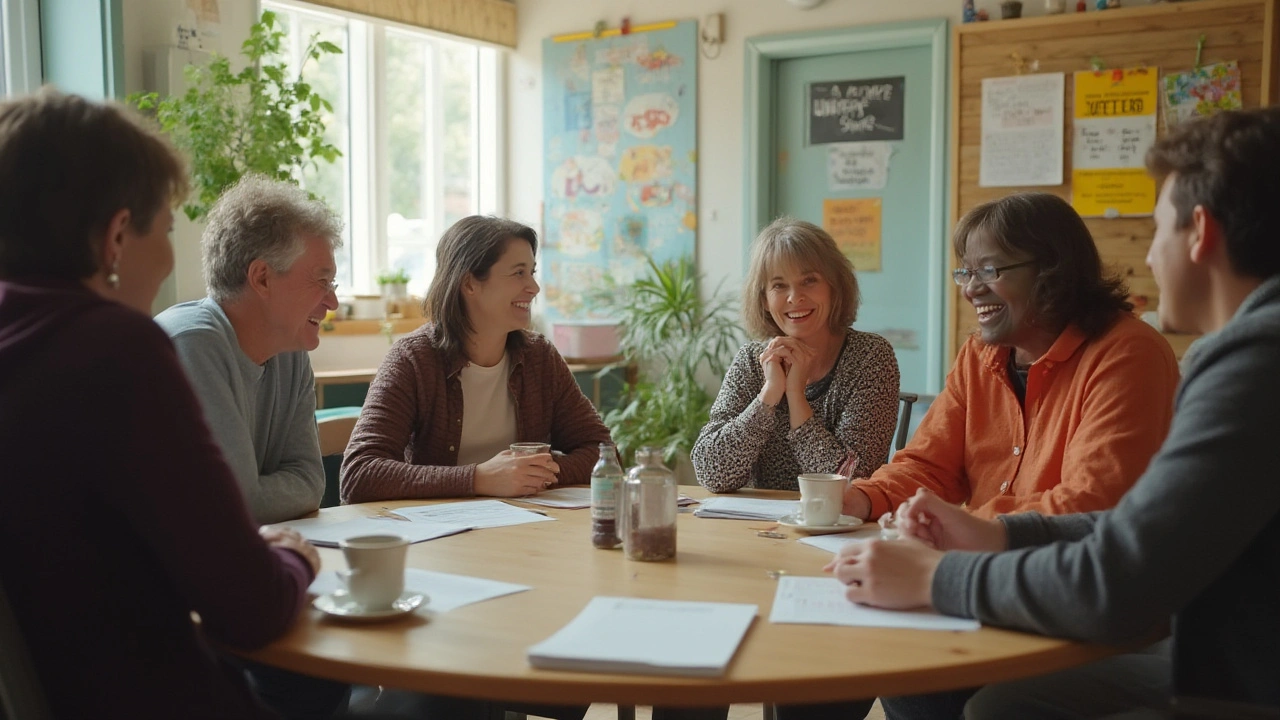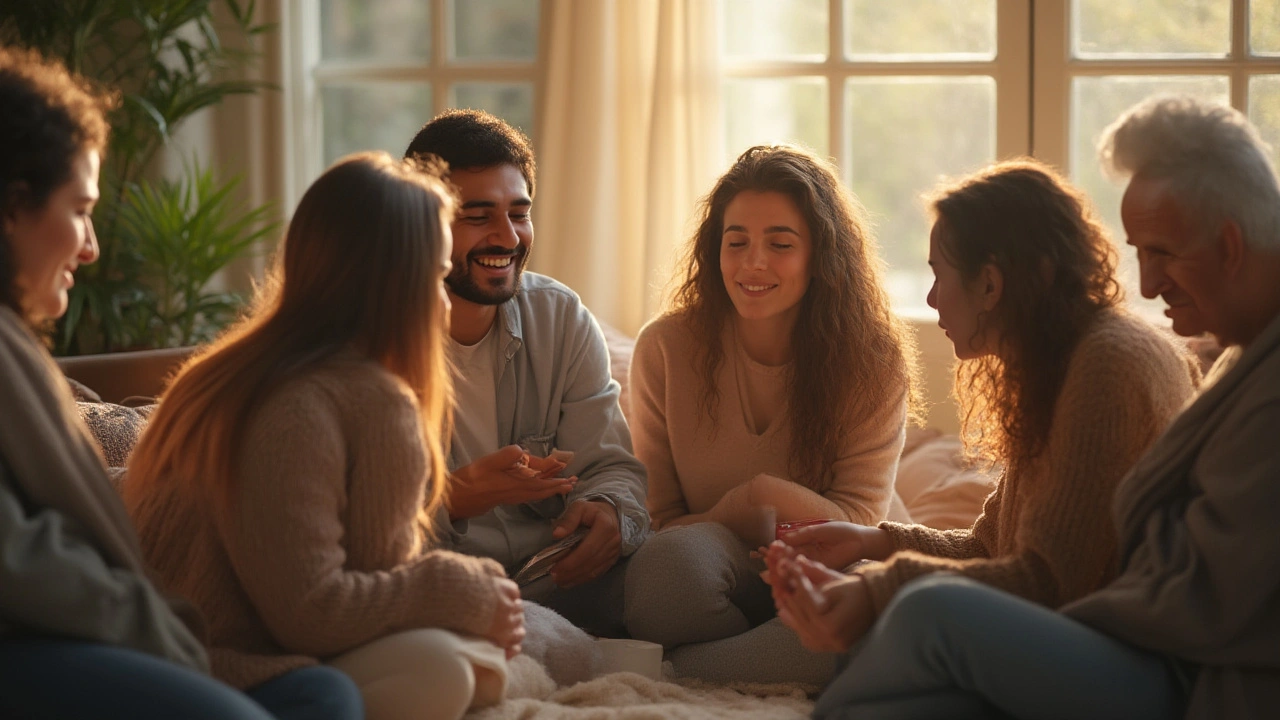It’s wild to think you can feel totally alone on a packed Durban beach, but that’s panic disorder for you. When a panic attack hits, the sounds fade, your heart races, and your mind starts running a horror movie in fast forward. Ask anyone living with this—they know isolation isn’t about empty rooms, but a silent kind that sticks even when you’re surrounded by people. Here’s a stat that might surprise you: the South African Depression and Anxiety Group (SADAG) estimates one in five South Africans struggle with anxiety disorders, yet most suffer in the shadows, often thinking no one would understand. This is where support groups quietly become gamechangers. But forget those cheesy film tropes of folding chairs and sad lighting—real support groups offer something most people just can’t find elsewhere: a space to belong when everything feels off.
The Power of Collective Experience
Panic disorder makes everyday life unpredictable, but one thing’s sure—when you find someone who simply gets it, there’s an instant bond. Everyone has their own triggers. Maybe it’s traffic jams on the M4 or the blare of a neighbor’s car alarm at 2 a.m. Support groups gather people with stories that echo your own. Yes, they’re complete strangers at first, but pretty quickly you realize that you’re less alone than you thought.
What sets support groups apart is shared reality. Think about this: a study from the University of Cape Town found that group-based interventions for anxiety disorders led to higher rates of progress and reduced relapse, compared to one-on-one therapy. Here, nobody’s lecturing you. Instead, you get the kind of nodding, open listening that’s tough to find outside of the room. That’s powerful. People swap strategies that actually work during those moments when your chest tightens, or your vision tunnels. Some share breathing techniques, others pass along numbers for late-night helplines. There’s usually that one person who’s memorized the location of every quiet coffee shop in town, just in case someone needs to step outside.
You’ll also come across the side of panic disorder that friends and family rarely see: the weird humor, the “I almost bailed on my own birthday” confessions, even the victories—like making it through a work meeting without bolting for the exit. When you see that raw honesty modeled by others, it can make it easier to open up about your own stuff. Vulnerability is tough, but in a support group, awkward silences get swapped for real talk and real comfort.
It doesn’t stop at just talking about fears. Over time, these groups start to build a toolbox of practical fixes. This might include:
- Weekly check-in routines
- Short guided meditations led by a member
- Role-playing difficult conversations (like how to explain an episode to a new boss)
- Sharing apps that track panic symptoms
- Split second distraction tactics, like counting all the green cars on the highway
Here’s where the magic sneaks up on you. It starts as an escape from isolation. Over time, support groups foster leadership, because members rotate roles—maybe you’re organizing the next meeting or helping a newcomer feel comfortable. This boosts confidence, and you start believing you can manage tough stuff in the real world too. The group quietly becomes more than a crutch; it’s a rehearsal for getting stronger everywhere else.

Growth, Healing, and Real Community
The real reason people stick with support groups goes beyond tips and tools. There’s healing in simply being believed. In South Africa, where stigma about mental health can keep people silent, a support group busts that shame wide open. Inside these groups, you see others just living, not hiding from their struggles or faking their way through public spaces like malls or churches.
A Durban-based study showed almost 70% of people attending ongoing anxiety support groups reported improved quality of life after six months. Why? Consistency counts. Weekly face-to-face meetings form community bonds. Regular meetups keep you accountable for self-care—think sleep routines, drinking enough water (especially on hot Durban days), or making yourself try that dirty chai latte you keep putting off.
Support groups have their own rhythm. With most, you don’t need an appointment, you just show up. Online groups make it easier—hopping onto a Zoom call in your pajamas, no judgment, because connection matters more than dress code.
Connection with others with panic disorder brings transformation. Those heavy, anxious Sunday evenings start feeling less dreadful when you know you’ll be seeing your group soon. Some groups go further, setting up WhatsApp groups for mid-week check-ins. Birthdays get celebrated, small wins get cheered, and setbacks get met with “We’ve got you. Try again tomorrow.”
The practical benefits extend outside the group too. The communication skills you polish within the group make tricky conversations outside a little easier. Whether it’s asking for accommodations at work or explaining to a partner why you suddenly need to leave a noisy restaurant, you find your voice. People who used to vanish at the first hint of discomfort start showing up to things—sometimes late, sometimes out of breath, but there. For panic disorder, that’s no small feat.
A support group can also plug you into wider mental health resources. Maybe someone’s found a nearby therapist who gets it, or there’s a new SADAG workshop happening in Durban North. You end up with a personal directory of resources tailored by people walking the walk—something a Google search can’t beat.

How to Find—and Make the Most of—Support Groups
Don’t know where to start? Finding a support group that fits might seem tricky, but you don’t need to live in a big city. SADAG hosts in-person and online support groups throughout South Africa. Larger community centers and even some local churches or mosques offer welcoming spaces, keeping it simple and pressure-free. If public groups are daunting at first, try guided online forums—anonymity helps some people share without fear.
Here are some tips for getting started:
- Scout for groups with a focus on panic disorder or broader anxiety. Sometimes trauma or grief support spaces are a good fit too.
- Try out different groups. Each has its own vibe. Some are structured with set topics, others are open-ended conversations.
- Set personal boundaries. You decide what you share and when. No one’s keeping score.
- Keep expectations low. The first session might be awkward—and that’s okay. Regulars will tell you everyone’s nervous at first.
- Be consistent. The more often you attend, the more comfortable you’ll feel and the more you’ll get out of it.
- Use online options if travel or timing is an issue. WhatsApp, Telegram, and Facebook host multiple local and global groups. Just double check that the spaces are moderated for safety.
| Fact | Stat/Info |
|---|---|
| Average age of onset for panic disorder | Late teens to early 30s |
| People with panic disorder in South Africa | Estimated 2+ million adults |
| Drop in panic symptoms after 6+ support group sessions | Up to 45% reduction (SADAG survey, 2023) |
| Percentage using digital support platforms in SA | Roughly 28% in 2024 |
| Mental health professionals who recommend support groups | Nearly 90% (SA Health Board poll, 2025) |
The big takeaway? You don’t have to “fix” panic disorder alone. Panic disorder support groups are scattered all over, in community halls from Joburg to Durban, and everywhere online. If you haven’t tried one, consider it. You just might find the thing you didn’t know you were missing: a community that gets you, right where you are.


Dilip Parmanand
July 10, 2025 AT 01:12I really love the idea of support groups for panic disorder. It is one thing to fight panic attacks alone and another to be surrounded by people who actually understand what you’re going through. Sharing tips and learning from others’ experiences can fast-track recovery in ways therapy alone might not.
Also, there is power in community and empathy that perhaps cannot be matched by medication or clinical interventions. Has anyone here attended such groups? Are there any online options you’d recommend for folks who cannot easily find local groups?
Sarah Seddon
July 10, 2025 AT 02:12Yes! Support groups can really be life-changing. I've seen so many people blossom after joining a group where they feel truly seen and heard. It’s like a safe harbor in the storm of panic disorder.
The shared stories, the collective resilience, and strategies people bring to the table create a boost that’s hard to find elsewhere. It’s almost magical how validation from others can ease the heaviness of panic symptoms. I would encourage anyone struggling not to hesitate to join one.
And to answer your question, the Panic and Anxiety Support groups on Facebook and Meetup are quite active and nurturing communities.
Quinn S.
July 10, 2025 AT 03:12While I recognize the potential benefit of support groups, it’s imperative not to overly romanticize them as a panacea. Panic disorder is a serious clinical condition that often requires well-structured therapeutic intervention alongside, or instead of, peer support.
Unsupervised groups might propagate inaccurate coping mechanisms or reinforce negative thinking patterns if not properly moderated. I urge individuals to be discerning and ensure they supplement such groups with credible professional guidance.
Were there any specifics on how these groups are structured to prevent misinformation?
Hannah Gorman
July 10, 2025 AT 04:12It's amusing how we now glorify these support groups like some sort of modern-day remedy for serious mental health disorders, failing to mention the essential role of professional psychological treatment. Honestly, people often join these groups looking for quick fixes or because they find it fashionable to share their struggles online.
Panic disorder isn’t cured by simply chat sessions; it’s about disciplined therapy and sometimes medications, carefully prescribed and monitored. Otherwise, what we're seeing is the creation of echo chambers where fear is compounded rather than alleviated.
Anna Marie
July 10, 2025 AT 05:12I’d just like to add that support groups don’t replace professional treatment but complement it beautifully, providing a platform for empathy and shared strength. This dual approach often results in better outcomes because patients feel less isolated and more hopeful.
Some of the best coping tips I’ve heard came from fellow sufferers, things that professionals might not even think to suggest because they’re not experiencing the disorder firsthand. This lived experience exchange is invaluable.
Are there measurable outcomes or studies proving support groups' efficacy? That might reassure skeptics.
Abdulraheem yahya
July 10, 2025 AT 06:12Gotta say, from my perspective, these groups do create a real impact that you don’t usually get elsewhere. I’ve seen individuals transform their relationship with anxiety by regularly attending, learning to harness their energy instead of fearing it.
We tend to underestimate the value of collective motivation and human connection, especially in mental health, where stigma often prevails. If people could all just witness one session, they might be converted.
What’s more, online groups have expanded access, making support truly global. However, the challenge remains to keep these groups constructive and not overly sentimental or unstructured.
Quinn S.
July 10, 2025 AT 07:12Adding to earlier points, it’s critical that participants distinguish between anecdotal advice and evidence-based methods. Blanket encouragement or benign clichés won’t help anyone long-term and might even discourage adherence to proper treatment plans.
I recommend that groups bring in licensed professionals periodically to provide accurate guidance and fact-checking. Otherwise, we risk turning these groups into well-meaning but potentially hazardous echo chambers.
Tatiana Akimova
July 10, 2025 AT 08:12Honestly, if you’re not in a support group and struggling with panic attacks, you’re missing out big time. It’s as simple as that. These spaces are where the heavy lifting happens—emotional breakthroughs, shared wisdom, and real encouragement all wrapped up in human kindness.
I’ve witnessed people not just survive but thrive because they found a tribe that holds them accountable, pushes them forward, and cheers their wins no matter how small.
Forget the cynics—yes, therapy is vital but so is community. Why settle for one when you can have both?